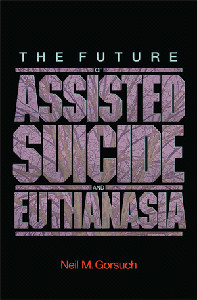 W
WCarter v Canada (AG), 2015 SCC 5 is a landmark Supreme Court of Canada decision where the prohibition of assisted suicide was challenged as contrary to the Canadian Charter of Rights and Freedoms ("Charter") by several parties, including the family of Kay Carter, a woman suffering from degenerative spinal stenosis, and Gloria Taylor, a woman suffering from amyotrophic lateral sclerosis ("ALS"). In a unanimous decision on February 6, 2015, the Court struck down the provision in the Criminal Code, thereby giving Canadian adults who are mentally competent and suffering intolerably and enduringly the right to a doctor's assistance in dying. This ruling overturned the Supreme Court's 1993 ruling in Rodriguez v British Columbia (AG), which had denied a right to assisted suicide.
 W
WDeath with Dignity National Center is a 501(c)(3) nonpartisan nonprofit organization, headquartered in Portland, Oregon, that has led the legal defense of and education about Death with Dignity laws throughout the United States for more than 25 years. The Death with Dignity National Center helped write and defend in courts the nation's first successful assisted dying law, the Oregon Death with Dignity Act, protecting the right of persons with terminal illness to control their own death. The Death with Dignity National Center is affiliated with the Death with Dignity Political Fund, a distinct and separately incorporated 501(c)(4) organization responsible for the promotion of death with dignity legislation in other states around the U.S.
 W
WThe Future of Assisted Suicide and Euthanasia is a 2006 book by Neil Gorsuch. The book presents legal and moral arguments against euthanasia and assisted suicide, advocating for the retention of bans on the practices. It explores case histories from jurisdictions that have legalized the practice, including Oregon and the Netherlands. The Future of Assisted Suicide and Euthanasia grew out of Gorsuch's doctoral dissertation. While attending Oxford University, he studied legal and ethical issues related to assisted suicide and euthanasia under John Finnis, an Australian legal scholar opposed to assisted suicide.
 W
WHow to Die in Oregon is a 2011 American documentary film produced and directed by Peter Richardson. It is set in the U.S. state of Oregon and covers the state's Death with Dignity Act that allows terminally ill patients to self-administer barbiturates prescribed by their physician to end their own life, referred to as assisted suicide by opponents and medical aid in dying by proponents.
 W
WJean's Way, a book by Derek Humphry, is an account of Humphry's terminally ill wife's planned suicide from suffering. The book is his first on the issue of voluntary euthanasia and assisted suicide.
 W
WPegasos Swiss Association or Pegasos is a non-profit group based in Basel, Switzerland with a minimal-bureaucracy approach to assisted suicide. They also have an office in Melbourne, Australia. In Greek mythology, Pegasus is a winged horse that the Pegasos association sees as symbolizing how patients speedily escape gravity on their final journey.
 W
WR (Nicklinson) v Ministry of Justice was a 2014 judgment by the Supreme Court of the United Kingdom that considered the question of the right to die in English law.
 W
WThe right to die is a concept based on the opinion that human beings are entitled to end their life or undergo voluntary euthanasia. Possession of this right is often understood that a person with a terminal illness, or without the will to continue living, should be allowed to end their own life, use assisted suicide, or to decline life-prolonging treatment. The question of whom, if anyone, should be empowered to make this decision is often central to the debate.
 W
WRodriguez v British Columbia (AG), [1993] 3 SCR 519 is a landmark Supreme Court of Canada decision where the prohibition of assisted suicide was challenged as contrary to the Canadian Charter of Rights and Freedoms ("Charter") by a terminally ill woman, Sue Rodriguez. In a 5–4 decision, the Court upheld the provision in the Criminal Code.
 W
WRamón Sampedro Cameán was a Spanish seaman and writer. Sampedro became a quadriplegic at the age of 25, following a diving accident, and fought for his right to an assisted suicide for the following 29 years.
 W
WTerry Pratchett: Choosing to Die is a 2011 one-off television documentary produced by KEO North for BBC Scotland on the subject of assisted death, directed and produced by Charlie Russell. It is presented by Terry Pratchett and features Peter Smedley, a 71-year-old motor neurone disease sufferer, dying by assisted death at the Swiss assisted dying organisation, Dignitas.
 W
WOn 29 November 2017, Victoria became the first Australian state to pass legislation allowing assisted suicide. The law gives anyone suffering a terminal illness, with less than six months to live, the right to end their life. The law had an 18-month implementation period, and came into effect on 19 June 2019.
 W
WInitiative 1000 (I-1000) of 2008 established the U.S. state of Washington's Death with Dignity Act, which legalizes medical aid in dying with certain restrictions. Passage of this initiative made Washington the second U.S. state to permit some terminally ill patients to determine the time of their own death. The effort was headed by former Governor Booth Gardner.